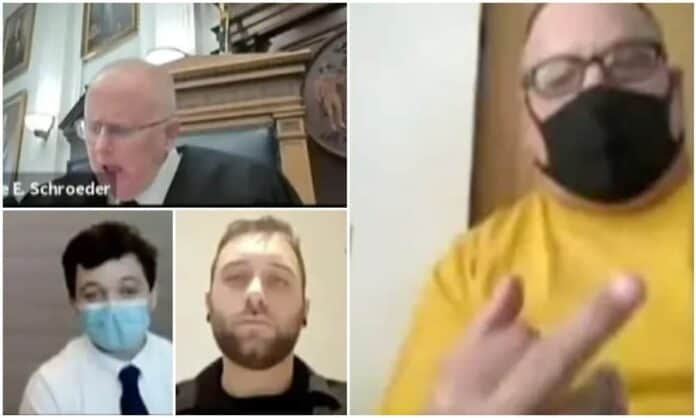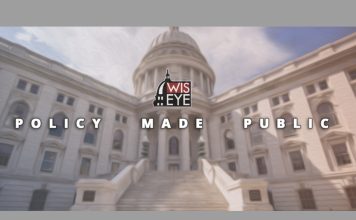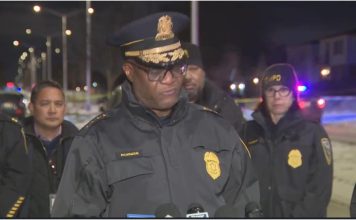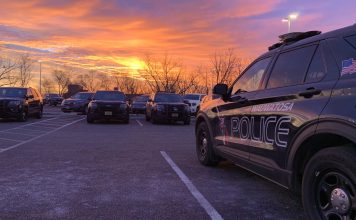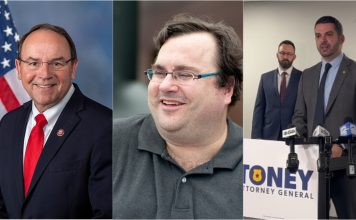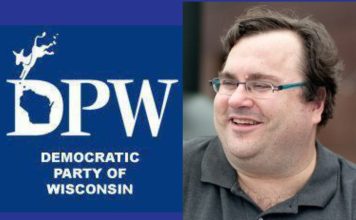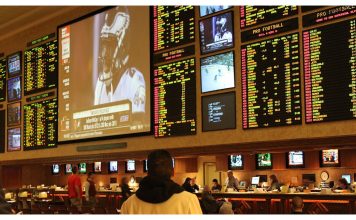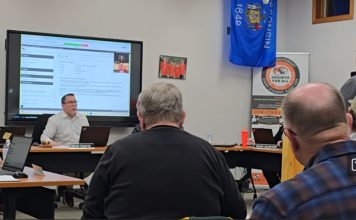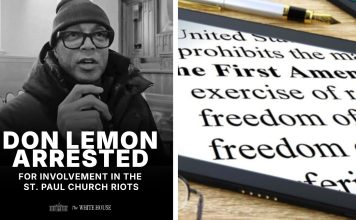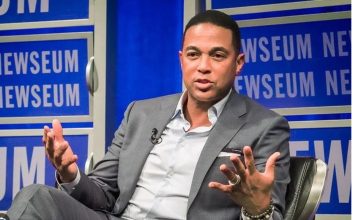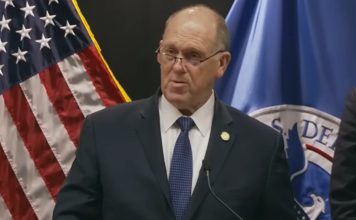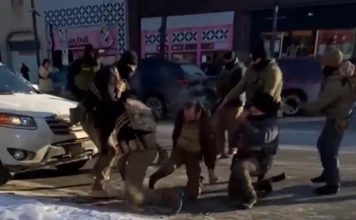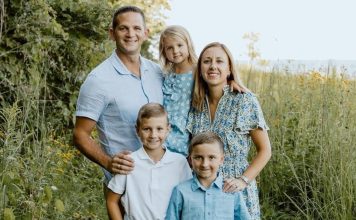Bruce Schroeder, the no-nonsense Kenosha County judge presiding over the Kyle Rittenhouse murder trial, didn’t mince words when he denied the prosecution’s request to issue an arrest warrant and increase Rittenhouse’s $2 million bail. Schroeder slammed the news media for false reporting, stopped the prosecutor from bringing up recent protests, said the DA’s office was asking him to violate the law in its motion, and allowed Rittenhouse’s address to remain under seal for his own safety, citing the riots that left damage to his own courtroom.
When the judge announced he was denying the motions, John Huber, the father of Anthony Huber, who was shot and killed by Rittenhouse while hitting Rittenhouse with a skateboard, flipped the judge off. Schroeder didn’t appear to notice.
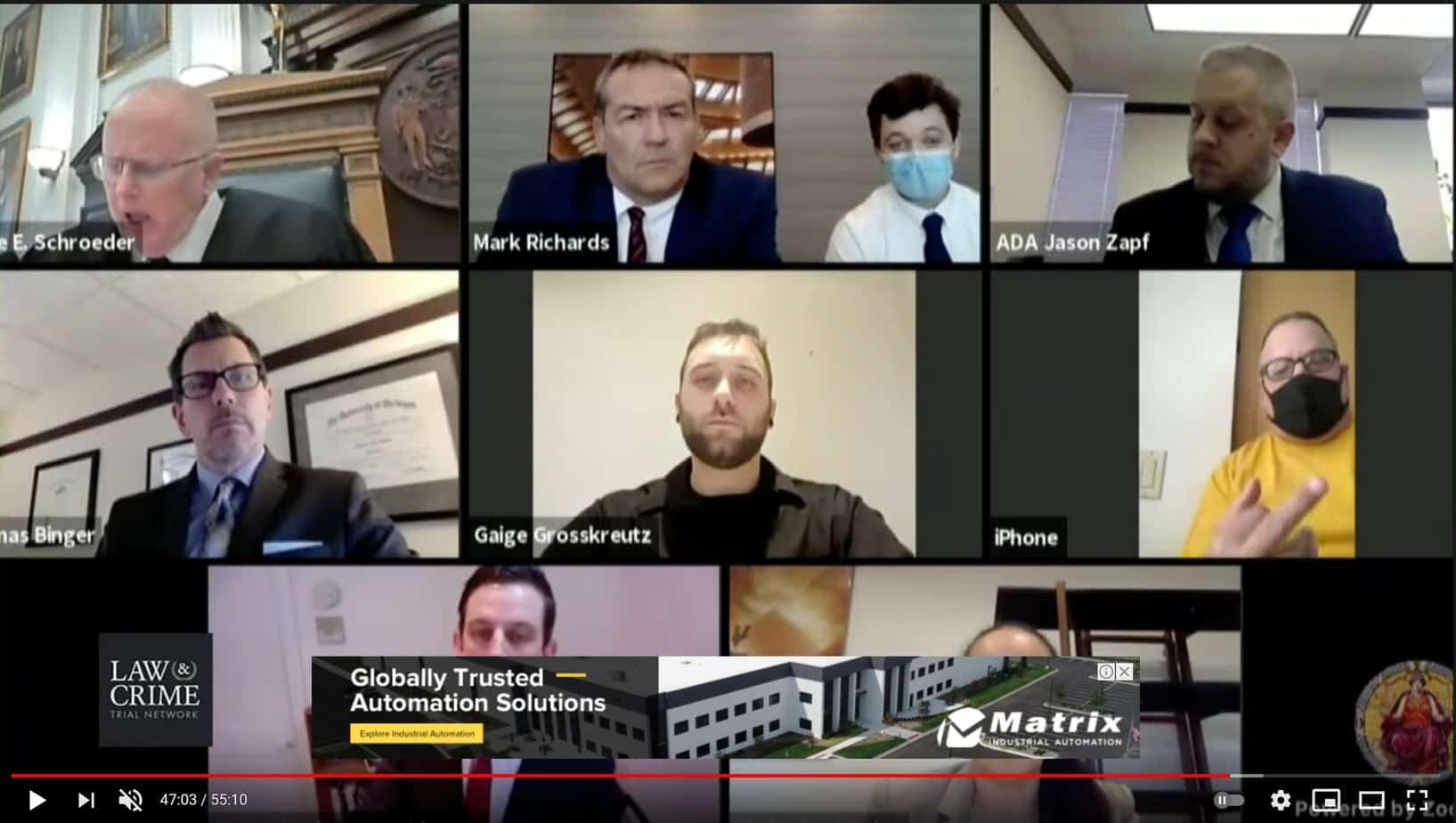
Here’s a short clip of Huber flipping the bird.
https://twitter.com/zerosum24/status/1359991414914965513
The judge soundly rejected attorney Kimberley Motley’s attempt to inject a racial argument into the case, telling her firmly that he doesn’t make decisions based on race.
Schroeder turned down Kenosha County Assistant District Attorney Thomas Binger’s request for an arrest warrant in the case because, he said, the DA was asking him to do something that’s against the law. Binger would have to show that Rittenhouse has committed a new serious crime and hasn’t, said the judge.
Watch the hearing here:
Binger wanted the sanctions – the warrant and a $200,000 bail increase – because Rittenhouse failed to update his Antioch, Illinois, address with the court; a court notice was returned to sender. But the judge said that Binger indicated that he knew Rittenhouse was not at that address back at his initial appearance and was likely living in a “safe house” for his own protection even back then. Thus, the judge questioned why it was suddenly a huge problem now, saying that many defendants fail to update their addresses with the court, and warrants are never issued for their arrest.
“You knew this at the time of the initial appearance,” said Schroeder. At another point, he said, “He was not put under condition of living at a specific address. That could have been done. The district attorney was aware of what he now refers to as flying the coop. There’s no change in circumstance there.”
The judge agreed Rittenhouse was in violation of that provision on updating the address but didn’t deem it serious enough to take punitive action. Just because the court tries to keep track of defendants’ addresses for the purpose of mailing them notices doesn’t mean that there’s a “restriction on place of abode,” he said. Schroeder said a restriction of where Rittenhouse can live could have been requested by the DA’s office at the initial appearance – but wasn’t.
On the warrant, he said, “I do not believe it’s possible to issue a warrant. I don’t think that would be lawful, no matter what feelings anyone has. I took an oath.” He disagreed with Binger’s statement that bail is a privilege, calling it a “right in the Constitution.”
Binger admitted he was not alleging such. “I am asking the court to increase the bond, however,” he added. Binger acknowledged that there is not the clear and convincing evidence necessary to seek bail revocation.
The judge did require that Rittenhouse submit his exact address – not a PO Box – to the court, but it will remain under seal. The judge refused to give the address to the DA’s office. He said he wanted to keep the case under seal to prevent additional violence, describing what happened in Kenosha as “ghastly.”
He said the number of defendants who fail to update their address with the court is 10% or maybe significantly more. “I’ve never jailed those people and never heard of another judge jailing those people,” said Schroeder.
As for why he was putting Rittenhouse’s address under seal, the judge said, “After what this town has been through in the last six months, I don’t want any more problems. The police don’t need any more problems; we don’t need people’s safety in jeopardy…” He told Binger the DA’s office couldn’t have the address because “I think the less of this the safer everybody is, you remember what went on six months ago here. I’ve got two broken windows here in this courtroom, doors still covered with plywood, there’s millions of dollars in damage in the community.” The only people authorized to get the address are the court and the Sheriff’s Department, which must keep it secret.
Schroeder added, “I don’t want anything to kindle further violence.” Binger retorted that he hoped the judge was “not suggesting that sharing this information with our office would lead to further violence. Our obligation is to monitor the defendant’s bail conditions.”
Binger stated earlier in the hearing that there was a protest of people in the community asking the DA’s office to revoke Rittenhouse’s bond, again provoking the judge’s scorn.
“No, no, I don’t want to hear about protests,” the judge snapped, growing testy. He said he didn’t want to deal with media reports that are inaccurate. “There were some very careless reports in the paper the other day after I issued the restriction on associations,” he said. “The media nationwide portrayed it that I had prohibited the defendant from associating with white supremacist groups. There is nothing in the order about that. It would certainly be encompassed within what I ordered but it was not limited. There was a report the other day that locally, that said you (the prosecutor) had issued a warrant for the defendant’s arrest. I think that’s what it said…” There was not a warrant issued.
Schroeder continued, “Look I want to have a fair trial in this case, and I want everybody …to act in a way that maximizes the possibility of fairness in this case, fairness to everybody who is involved. This case is not going to be decided by demonstrators of one type or the other; frankly, it’s not going to affect anything I do. I don’t want to whip stuff up so it affects a fair trial in this case, to decide it strictly on the evidence. I don’t want to hear about a demonstration last weekend okay because if we do that tomorrow we will have a demonstration by people who do things differently.”
The judge also repeatedly admonished all parties to not refer to anyone as a “victim” in the case because it’s pending. He said that’s a longstanding practice he’s used for years.
Motley is representing Gaige Grosskreutz, who was shot in the arm by Rittenhouse, and the estate of Joseph Rosenbaum. Rosenbaum is the convicted child molester who was shot and killed first by Rittenhouse as Rosenbaum charged toward Rittenhouse (see our past reporting from an eye witness who believes Rosenbaum was chasing Rittenhouse in an aggressive and predatory fashion). Rittenhouse’s lawyers have argued that he acted in self defense when shooting the two men and Anthony Huber, who was rushing toward Rittenhouse and struck him with a skateboard when shot. Grosskreutz was moving toward Rittenhouse with a gun in hand when he was shot in the arm. The district attorney, however, hit Rittenhouse with homicide counts. Grosskreutz and Huber’s father were present in court during the Zoom hearing.
At one point, Rittenhouse’s lawyer mentioned that Grosskreutz’s address is sealed in a Milwaukee court case he’s facing in an attempt to get the judge to seal Rittenhouse’s address. The judge said he didn’t want to hear about unrelated court cases (Grosskreutz was charged with a second-offense drunk driving misdemeanor in July out of West Allis).
Binger said that it was a “very unusual situation to have someone facing these types of charges released from custody.” According to Binger, Rittenhouse violated an order to update his address within 48 hours. The prosecutor said when he said at the initial appearance that he didn’t necessarily think Rittenhouse was living at the Antioch address, he thought the family was “continuing to maintain residence. I didn’t know they moved out entirely.” He called it an “unusual and dangerous situation” to not know Rittenhouse’s exact address. He argued that the “defendant has no stake in that bond” that was posted because the money was donated.
“The defendant needs to be kept on a very short lease,” said Binger.
Binger expressed concern about the safety of the people now living at the home
John Huber, the father of Anthony Huber, made an emotional statement in court.
“From the beginning from the moment he became a killer he thought he was above the law,” he alleged of Rittenhouse. “He has no remorse for what he’s done; he’s enjoying this media circus and support from these hate groups and militia members who have posted his bond.” He wanted Rittenhouse remanded into custody and his bond set at $4 million, saying, “We lost a son. His mom and I lost our son. How would you feel if the killer of your son is just able to walk free and make videos in bars and live it up. Whatever the statutes are they must be wrong. This guy can go and do whatever.”
Grosskreutz agreed with Huber, saying Rittenhouse showed “a pattern of lack of remorse.”
Motley asked for the same, saying she was “very disturbed by his behavior.” She also requested electronic monitoring and for Rittenhouse’s passport to be surrendered, which the judge did not grant. Motley raised another case in which a “male of color” in a double homicide received $2.5 million bond.
Schroeder responded that he was “not going to decide this case or any other on the basis of anyone’s skin” and launched into a lengthy legal history lesson.
“I don’t know anything about that other case, I don’t know who the judge was, I didn’t set this bond or that bond; I’m not going to comment at all on that,” he said. The Rittenhouse bond amount was set by another judge.
“He appears to be living it up, going to bars, throwing up white domestic terrorist white supremacist signs while wearing inappropriate attire chugging down three beers,” she said.
Rittenhouse’s lawyer Mark Richards said that Rittenhouse is not running and he was not hiding; he said that Binger “knew from the beginning that he was not at Antioch.” He agreed to provide the court with Rittenhouse’s physical address under seal.
He said Rittenhouse has made all his court appearances, including one after the notice letter was returned to sender. He said he, the attorney, should have been more diligent about giving the court a forwarding address. He said Rittenhouse has received threats, adding, “All it takes is one crackpot, and there’s a problem.”
He noted that Rittenhouse is not going to run; “my client will appear. He looks forward to litigating. We have nothing to fear. The truth will set my client free.”


